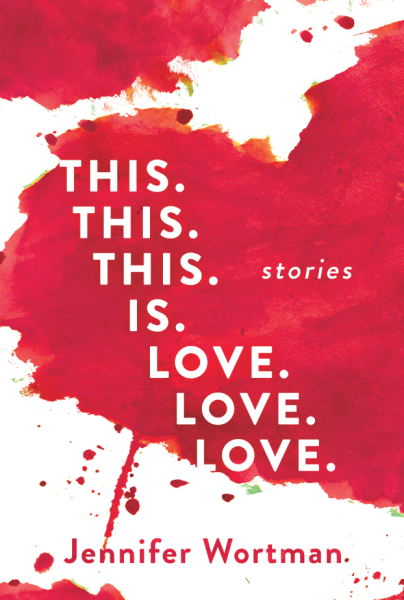
by Julia Tagliere
During an AWP panel this year, author Bethanne Patrick spoke of the difficulties of writing about depression: “The trickiness of writing mental illness, the biggest pitfall, is that depression is boring. Relentless. Tedious. How do you captivate the reader without diminishing how that feels?”
Plenty of books focus on more—from a literary sense—“dramatic” aspects of depression, those gripping depictions of suicide attempts, addiction, and other types of self-harm that make for very intense reads. It’s unusual for a book to focus on the more tedious manifestations of depression, like lethargy or inertia, because those are tough to write in a captivating way. But Jennifer Wortman homes in like a laser beam on precisely those aspects in her new collection of short stories and flash fiction, This. This. This. Is. Love. Love. Love., published in June 2019 by Split Lip Press. Wortman uses her clear, tender prose to paint a nuanced, realistic, and at times, wryly funny portrait of the day-to-day realities of living with mental health issues, exploring as well how inextricably our mental health is intertwined with other aspects of our lives, like family dynamics, isolation, and addiction.
In this passage from the title story, “This. This. This. Is. Love. Love. Love.,” Wortman captures in sharp detail what might seem, to those unfamiliar with these less “dramatic” manifestations of depression, a simple matter of being unable to get out of bed. That would be tough to write in a captivating way, but Wortman nails with gorgeous interiority the narrator’s harrowing immobilization, subtly underscoring as well that for all its surface mundanity, the narrator’s de facto paralysis is no less perilous a moment than if she were holding a razor to her wrist:
I hoisted the phone into the bed and called in sick to work. Call your therapist, I told myself. I did not. At least take your meds. But they were in the bathroom, on the other side of the globe. Hours passed. I had to pee, but I held it in. Once I stood upright and entered the vast realm of the world, anything could happen. At least under my covers, my bladder engorged but dependable, I knew what to expect. Darkness. Excessive warmth. Quiet, save the passing city-street noises and the constant buzz of my brain.
Parent-child relationships in Wortman’s stories, some of which first appeared in publications like Glimmer Train, PANK, and Hobart, among others, are often deeply complicated. In “What Family Does,” for example, a teenage daughter tries to reconcile her scorching contempt at the way her father treats her too-submissive mother with the impact it has on their relationship. In one of the more intense passages of the story, the narrator returns home to her very distressed parents and her grandfather (who has recently moved in with them) after sneaking out and having her first—and unsettling—sexual experience with a boy.
‘You can’t just leave in the middle of the night,’ my mother shrieked. ‘You’re sixteen years old. Terrible things can happen out there. To anyone.’
She looked small and wild, a trapped, harmless animal trying to make fearsome noise.
‘Terrible things happen in here,’ I said. I almost stopped there, but I saw my father’s rapt expression, egging me on. ‘Dad can hardly stand you and you act like it’s okay. You’re pathetic.’
When her grandfather strikes her for her disrespect, the narrator, already emotionally vulnerable because of her earlier disquieting experience with the boy, looks to her mother to defend her, only to find her mother, closer to her father-in-law than her husband, is suddenly no longer passive in response to conflict:
My mother spun toward me, her eyes alien and hateful. ‘It didn’t even hurt!’ she hissed. ‘I could tell.’
I flinched. My mother had never turned against me like this before. I didn’t know she could.
The notion that a compulsive desire to win a loved one’s approval and the failure—perceived or real—to do so, as well as its effects on mental health, feature prominently in Wortman’s stories. As with this father, a parent who is nominally supportive one moment and cruel the next is featured in the title story “This. This. This. Is. Love. Love. Love.”
I pressed my ear hard to the phone, as if it were a shell secreting sounds of a distant sea. My father inhaled. “Your life,” he finally said. “This is what happens when people lack education I’m disappointed in you.”
There it was, finally spoken in words. For a moment, I couldn’t breathe. Then my mouth opened and said, “I’m disappointed in you, too.”
My small apartment, the scuffed wood floor, the dusty TV, the empty walls, the card table I used as a desk, suddenly seemed huge, the terminus of a vast space between us I would always wander.
“Well then,” he eventually replied. “And so it is.”
“And so it is.”
We hung up. Something inside me severed, and the grief gushed like blood.
Wortman captures the constant, unrelenting fight those with mental health issues may find themselves facing against debilitating inertia, self-imposed isolation, the painful weight of others’ good intentions, and even, at times, an urgent bent toward self-destruction. A few examples:
Sometimes, in an attempt to feel better, I’d drink whatever someone gave me and sleep with whatever boy appeared, but it always made me feel worse. Though none of that really explains why I felt so bad, so often, or why after a while, I stopped trying to feel good…I stopped trying to do anything: go to class, wash, eat, speak, get out of bed.
— “This. This. This. Is. Love. Love. Love.”
Back when I’d taken to bed, he’d begged me to talk to him. But he didn’t much like what I’d say.
‘I feel so heavy.’
‘You have a beautiful figure.’
‘That’s not what I mean. I feel weighed down. Like my limbs are full of sand.’
He’d straighten from his perch on the bed. ‘But they’re not,’ he’d say. ‘You just need to realize that.’
‘I can’t. You’re making it worse.’
‘Worse? You won’t leave your bed. How could it be worse?’
‘You can’t fix everything,’ I’d say. ‘What if I’m not broken?’
— “Slumber Party”
Wortman’s narrator says in “This. This. This. Is. Love. Love. Love.”: “The problem with depression is people think they understand it. They think it’s not that different from plain old sadness. But most people don’t understand depression.” Wortman clearly does, and not just the dramatic or “big” moments on which many other works have focused; instead, she shines a necessary light on depression’s lesser-known but no less agonizing dark corners, applying generous grace and keen insight to help her readers feel, and perhaps better understand, the insidious “everydayness” of mental illness.
_________________________
 Julia Tagliere’s work has appeared or is forthcoming in The Writer, Potomac Review, Gargoyle Magazine, Washington Independent Review of Books, and numerous anthologies. Winner of the 2015 William Faulkner Literary Competition for Best Short Story and the 2017 Writers Center Undiscovered Voices Fellowship, Julia completed her M.A. in Writing at Johns Hopkins University. She serves as an editor with The Baltimore Review and is currently working on her next novel, The Day the Music Didn’t Die. Contact her at julia@justscribbling.com.
Julia Tagliere’s work has appeared or is forthcoming in The Writer, Potomac Review, Gargoyle Magazine, Washington Independent Review of Books, and numerous anthologies. Winner of the 2015 William Faulkner Literary Competition for Best Short Story and the 2017 Writers Center Undiscovered Voices Fellowship, Julia completed her M.A. in Writing at Johns Hopkins University. She serves as an editor with The Baltimore Review and is currently working on her next novel, The Day the Music Didn’t Die. Contact her at julia@justscribbling.com.

 The core workshop of SmokeLong Fitness is all in writing, so you can take part from anywhere at anytime. We are excited about creating a supportive, consistent and structured environment for flash writers to work on their craft in a community. We are thrilled and proud to say that our workshop participants have won, placed, or been listed in every major flash competition. Community works.
The core workshop of SmokeLong Fitness is all in writing, so you can take part from anywhere at anytime. We are excited about creating a supportive, consistent and structured environment for flash writers to work on their craft in a community. We are thrilled and proud to say that our workshop participants have won, placed, or been listed in every major flash competition. Community works.